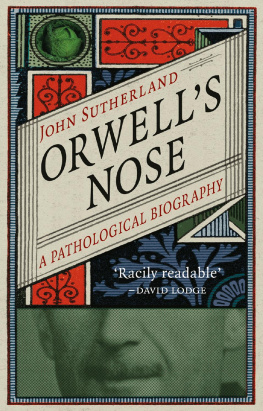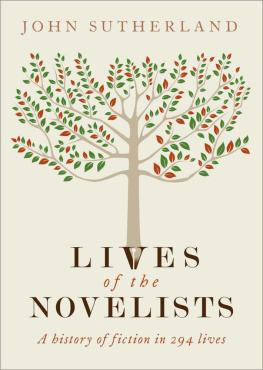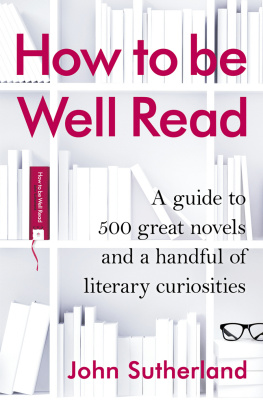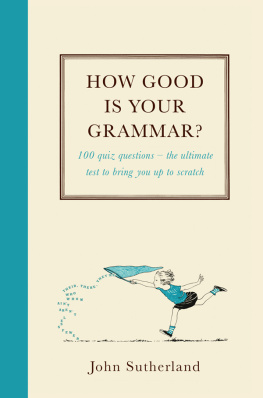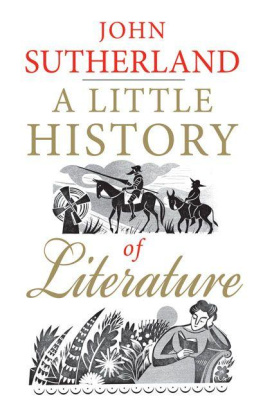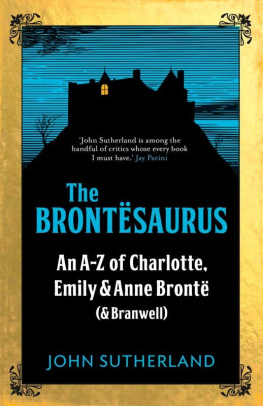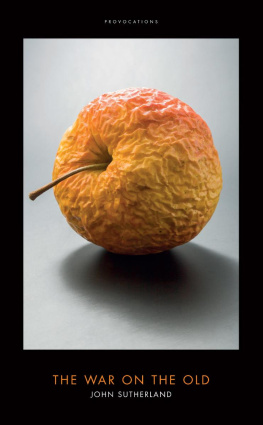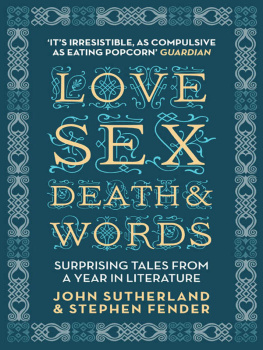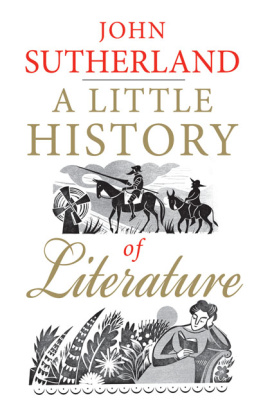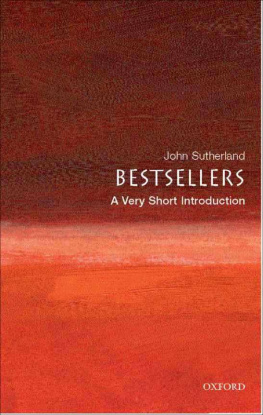John Sutherland - 50 Literature Ideas You Really Need to Know
Here you can read online John Sutherland - 50 Literature Ideas You Really Need to Know full text of the book (entire story) in english for free. Download pdf and epub, get meaning, cover and reviews about this ebook. year: 2011, publisher: Quercus, genre: Detective and thriller. Description of the work, (preface) as well as reviews are available. Best literature library LitArk.com created for fans of good reading and offers a wide selection of genres:
Romance novel
Science fiction
Adventure
Detective
Science
History
Home and family
Prose
Art
Politics
Computer
Non-fiction
Religion
Business
Children
Humor
Choose a favorite category and find really read worthwhile books. Enjoy immersion in the world of imagination, feel the emotions of the characters or learn something new for yourself, make an fascinating discovery.

- Book:50 Literature Ideas You Really Need to Know
- Author:
- Publisher:Quercus
- Genre:
- Year:2011
- Rating:5 / 5
- Favourites:Add to favourites
- Your mark:
- 100
- 1
- 2
- 3
- 4
- 5
50 Literature Ideas You Really Need to Know: summary, description and annotation
We offer to read an annotation, description, summary or preface (depends on what the author of the book "50 Literature Ideas You Really Need to Know" wrote himself). If you haven't found the necessary information about the book — write in the comments, we will try to find it.
50 Literature Ideas You Really Need to Know — read online for free the complete book (whole text) full work
Below is the text of the book, divided by pages. System saving the place of the last page read, allows you to conveniently read the book "50 Literature Ideas You Really Need to Know" online for free, without having to search again every time where you left off. Put a bookmark, and you can go to the page where you finished reading at any time.
Font size:
Interval:
Bookmark:
SOME BASICS
MACHINERY: HOW IT WORKS
LITERATURES DEVICES
NEW IDEAS
WORD CRIMES
LITERARY FUTURES
you really need to know

John Sutherland

First published in 2010
This ebook edition published in 2013 by
Quercus Editions Ltd
55 Baker Street
7th Floor, South Block
London
W1U 8EW
Copyright John Sutherland 2010
The moral right of John Sutherland to be identified as the author of this work has been asserted in accordance with the Copyright, Design and Patents Act, 1988.
All rights reserved. No part of this publication may be reproduced, stored in a retrieval system, or transmitted in any form or by any means, electronic, mechanical, photocopying, recording, or otherwise, without the prior permission in writing of the copyright owner and publisher.
Quercus Publishing Plc hereby exclude all liability to the extent permitted by law for any errors or omissions in this book and for any loss, damage or expense (whether direct or indirect) suffered by a third party relying on any information contained in this book.
A catalogue record of this book is available from the British Library
Ebook ISBN 978 1 84916 565 5
Print ISBN 978 1 84866 060 1
Prepared by Starfish Design, Editorial and Project Management Ltd.
You can find this and many other great books at:
www.quercusbooks.co.uk
Literary criticism suffers from two opposite objections. One is that the enterprise is too easy (Anyone can read Pride and Prejudice intelligently). The other is that it is mind-numbingly difficult (What on earth does extradiegetic analepsis in Pride and Prejudice mean? And who cares?).
A first point to be made is the inherently dualistic nature of literary criticism. There is no clear dividing line between theory and practice. Many of the ideas about literature and how best to understand it originate with writers themselves. Indeed, according to T. S. Eliot it is only those who create literature who can write usefully about it. All the rest is what D. H. Lawrence calls critical twiddle-twaddle.
One would not claim (to take a rather fanciful example) that it is only those who make history who can be historians. And not everyone indeed relatively few who have thought about it would agree with Eliot, the author of The Waste Land (the greatest poem of the twentieth century) and The Sacred Wood (one of the greatest volumes of literary criticism of the century). But ultimately those who merely write, or talk, about literature (particularly those who are paid to do so) should be humble in their judgements and prepared to defer to the comments of those who actually make the stuff. What would one not give for Shakespeares views on his own drama? Would they not be worth more than all the reams of Shakespearian criticism ever written?
No criticism or theory can explain a literary work that is one of the perennial fascinations of great literature. We still do not wholly understand Shakespeare, even after 400 years of thinking about him. But the well-equipped reader will want to have the best toolkit currently available. This book, and the 50 big ideas it contains, aims to assemble just such a kit. Clearly at some point every mature reader will decide on the approaches that work best for them. A new historicist and a structuralist, for example (to take two of the ideas discussed below) come at texts from wholly different directions, and the conclusions they reach may well not be compatible. But knowing the different techniques gives the reader a wider set of options more spanners in the toolkit, so to speak.
There is one idea above all others that should be borne in mind. Namely that literature is ultimately there to give pleasure. Read intelligently, it is one of the very highest pleasures life has to offer.
Mimesis can be defined as holding a mirror up to nature. The Ancient Greek term pronounced my-mees-is is preferable to the English translation, imitation, which carries with it a pejorative overtone of mere copy. Inadequate too is representation. Mimesis carries more weight than that word. The concept of Mimesis, writes Stephen Halliwell, in a recent book on the topic, lies at the core of the entire history of Western attempts to make sense of representational art and its values. It is both fundamental and, at the same time, fiendishly slippery.
The key to the literary door The problem mimesis raises is perennial, fascinating, and, finally, insoluble. Is literature true, or is it false? It is, of course, both. Or neither some would argue that the question itself is a category error (e.g. What is north of the North Pole?).
The idea of mimesis was put into literary-critical circulation by Aristotle, in his fragmentary treatise The Poetics. The title does not indicate an exclusive attention to poetry, but to all literary fabrication. Aristotle was fascinated by the mysterious process by which certain black marks on a white surface or sounds in the ear become, for example, an epic (The Odyssey).
In his extended defence of mimesis as the way in which that trick is performed, Aristotle was quarrelling with an even more authoritative philosopher than himself. Notoriously, in his anatomy of the ideal state, The Republic, Plato exiled the poets. He admired the aesthetic quality of their imitations (they would, he decreed, go into the wilderness outside the city gates garlanded), but their creations were intrinsically superficial, subjective and untrue. The critic Mark Edmundson puts it wittily: Literary criticism in the West begins with the wish that literature disappears.
For Plato, literature was the mere shadow of reality. Truth was the province of the philosopher-king, not the artist. Worse than that, poetry inspired emotional, not rational, responses. Mimesis created Beautiful Lies. It led to bad decisions and bad living. Life requires cool heads and clear eyes.
Mimesis is the primary dramatic phenomenon: projecting oneself outside oneself and then acting as though one had really entered another body, another character.
Friedrich Nietzsche
Refuting Plato Aristotle refutes the primary Platonic objection (historical untruth) elegantly turning the dagger against its wielder. Literary art (epic, tragedy, comedy, lyric), he points out, is unfettered by the accidents and randomness of mere history and can therefore, employing that literary freedom, articulate essential, eternal or higher truths.
For example: there never was a woman called Anna Karenina who committed adultery, abandoned her family and killed herself at a railway station. She is fiction. But the proposition with which Tolstoys novel opens Happy families are all alike; every unhappy family is unhappy in its own way has the status of what another novelist, in her opening sentence, called a truth universally acknowledged. Fiction, in this line of argument, can be truer than fact. It can, in Graham Greenes phrase, get to the heart of the matter. Society needs literatures truths.
Aristotles defence against Platos second objection that mimetic art and literature overstimulates the emotions (our eyes moisten at the death of Leonardo DiCaprio in Titanic, but we pass by, hard-eyed, the beggar outside the cinema) is less convincing. Aristotle concedes that art does indeed move us: that is one of its primary reasons for existence. Athenian women, he records, had been known to miscarry and boys to faint when watching tragedy. But the emotion that literature generates, he goes on to argue, is cathartic.
Font size:
Interval:
Bookmark:
Similar books «50 Literature Ideas You Really Need to Know»
Look at similar books to 50 Literature Ideas You Really Need to Know. We have selected literature similar in name and meaning in the hope of providing readers with more options to find new, interesting, not yet read works.
Discussion, reviews of the book 50 Literature Ideas You Really Need to Know and just readers' own opinions. Leave your comments, write what you think about the work, its meaning or the main characters. Specify what exactly you liked and what you didn't like, and why you think so.

